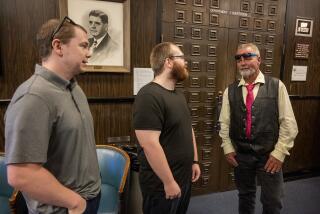Victim of Horror Finally Speaks
- Share via
When Ginny Petersen gathered signatures door-to-door this summer for a court reform ballot initiative, she said, she wanted to explain to people the real reason she was there. But a judge’s gag order kept her quiet.
Petersen, 31, and her husband, Christopher, 42, were both shot in the head by the Night Stalker serial killer Richard Ramirez, on Aug. 6, 1985, while asleep in the Northridge home they shared with their then 4-year-old daughter.
Ramirez since has been convicted of that attack, as well as of 13 murders in Los Angeles County. Petersen testified that Ramirez was the man who shot them both. But she and her husband, like all other Night Stalker victims, were ordered not to speak about the case until last week, when a jury recommended the death sentence for Ramirez.
Her husband still suffers severe pain from a bullet in his neck lodged near his spinal cord. The bullet that hit Ginny Petersen passed through her body, but black flecks from the gunpowder still appear under Petersen’s left eye, a permanent reminder of her terror. The injury also has left her with headaches and bothersome spasms.
“The memory of what happened never leaves; it’s ingrained as a part of your life, just like the color of your hair,” Petersen said Wednesday at her first public appearance since Ramirez’s arrest four years ago.
Petersen was among several crime victims who spoke Wednesday outside the Orange County registrar’s office in Santa Ana, where a group called MOVE (Memory of Victims Everywhere) turned in more than 100,000 signatures on petitions for a state court reform initiative. Leaders of the victims’ rights initiative say they already have more than the 595,000 signatures needed to qualify the measure for the statewide ballot next June.
Supporters said they will submit signatures on petitions gathered in Los Angeles and San Diego counties today.
The 13-point initiative would increase penalties for some murders and increase the types of murders for which the death penalty can be sought. It would stiffen penalties for minors convicted of first-degree murder and prohibit post-indictment preliminary hearings.
The initiative also defines the term “torture” and mandates that the penalty for that crime be life imprisonment.
A key aim of the measure, which is opposed by many civil libertarians, is to speed up the time between arrest and trial.
While Petersen said she is not bitter about the numerous delays in the Night Stalker trial, she added that her life would have been better had the trial ended sooner.
Petersen said her daughter, who is now 8, is very much aware of what happened because of the trial.
“If this had been over by the time she was 6 or 6 1/2, it would not have been a major part of her life like it is today,” she said.
“The cards my husband and I were dealt that night were not what we chose for ourselves,” Petersen told supporters of the initiative Wednesday.
Afterward, Petersen said that four years ago, she would never have pictured herself working with a group such as the victims’ rights committee.
“At the time, we were a happy young couple just starting out in life,” she said. “Now, we’re a couple trying to survive.”
Christopher Petersen was forced to leave a physically demanding job he had held for more than 11 years, as a warehouse manager, to take a less strenuous desk job, she said. Ginny Petersen had been a postal clerk but now is unemployed.
Petersen added that they have moved from Northridge but declined to disclose her current address, which is in the same general area.
Petersen’s interest in court reform was sparked when she saw Collene Campbell, a sister of slain racing entrepreneur Mickey Thompson, speaking on television.
“I called Collene and said I wanted to help,” Petersen said. “My husband and I made up our minds that we were going to be survivors. And I thought that if I wanted change, then I was responsible for helping to initiate that change.”
More to Read
Sign up for Essential California
The most important California stories and recommendations in your inbox every morning.
You may occasionally receive promotional content from the Los Angeles Times.













